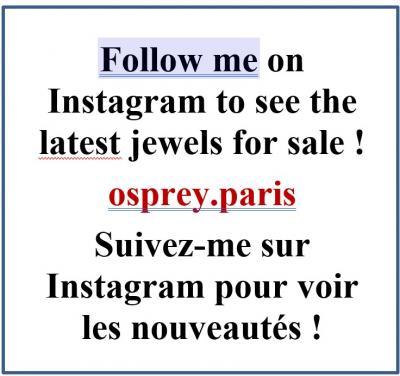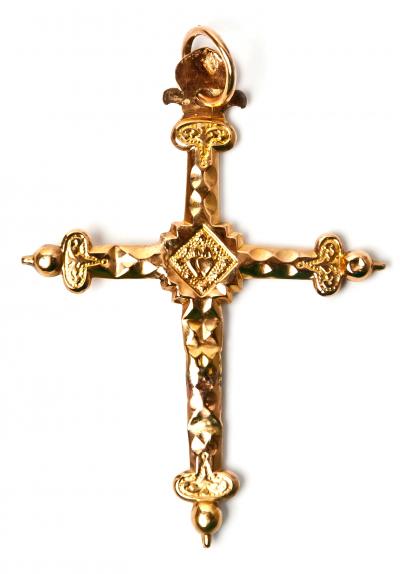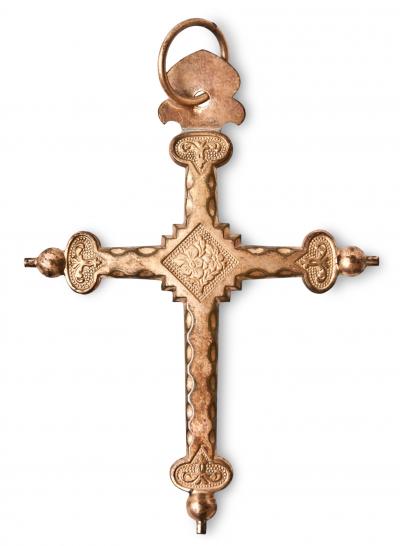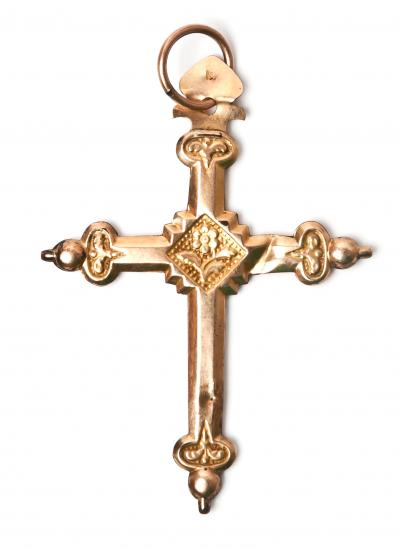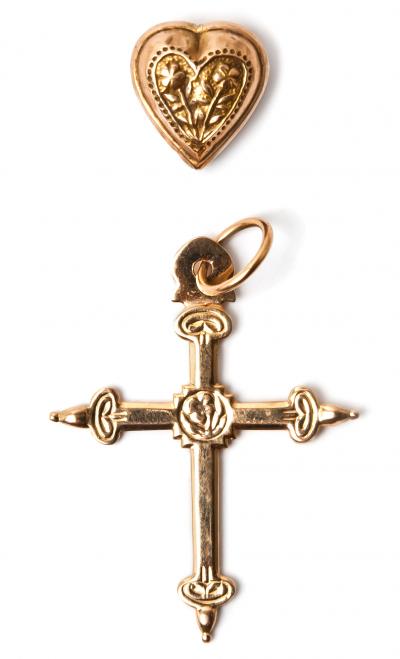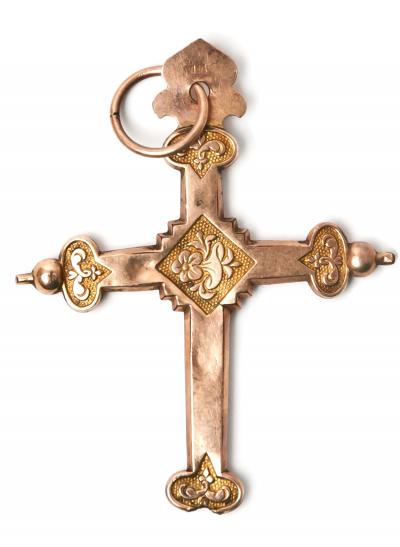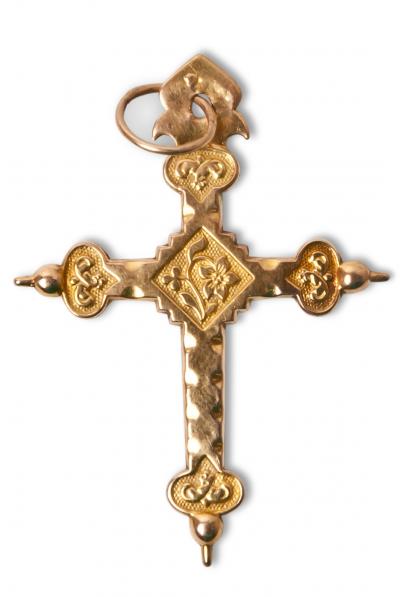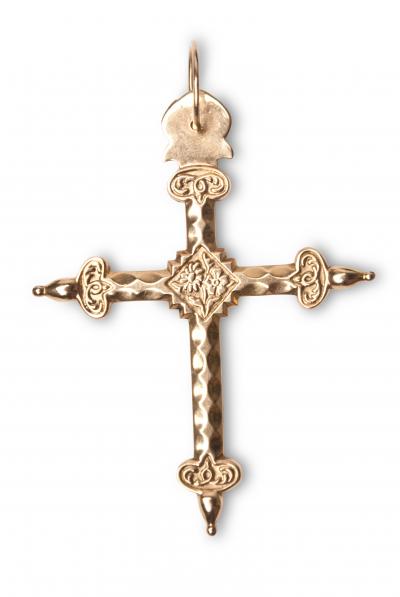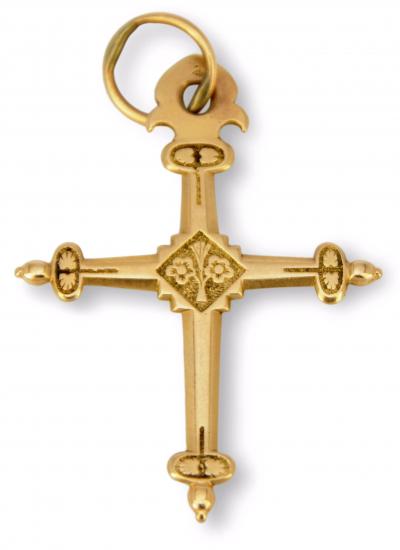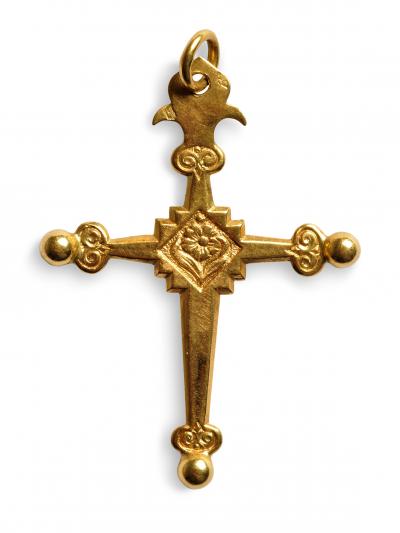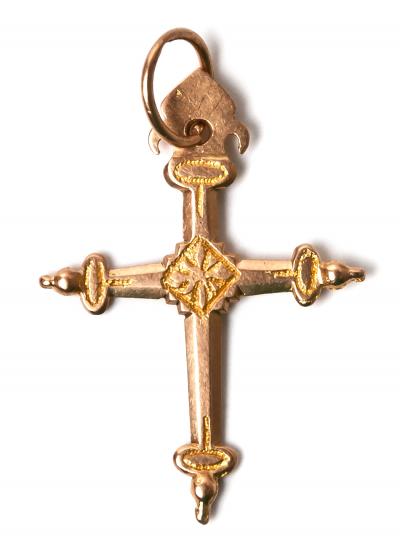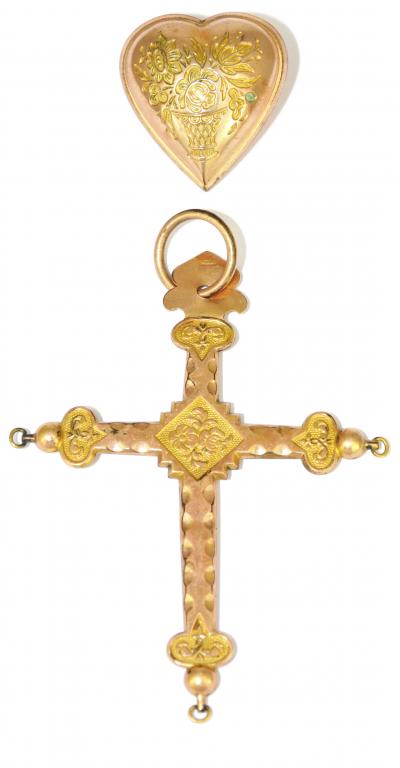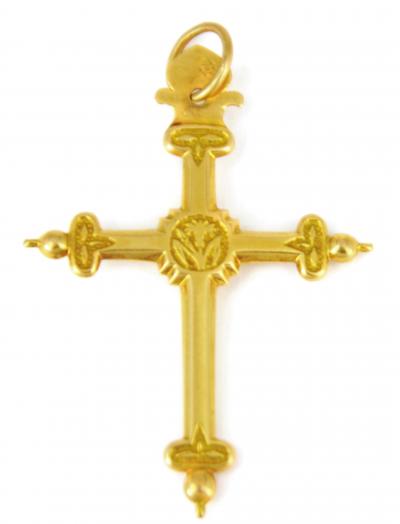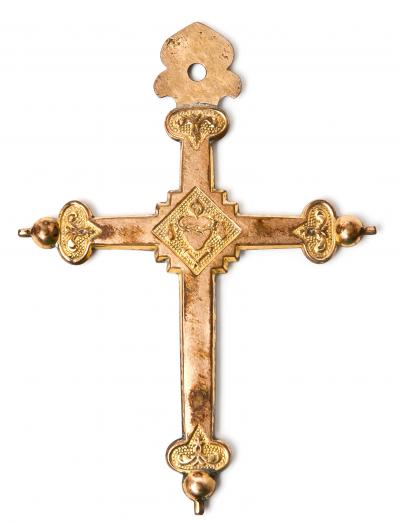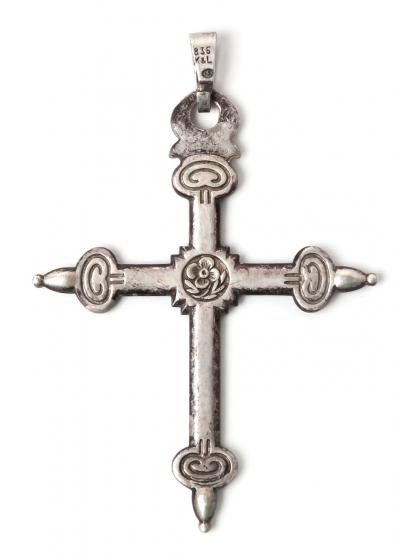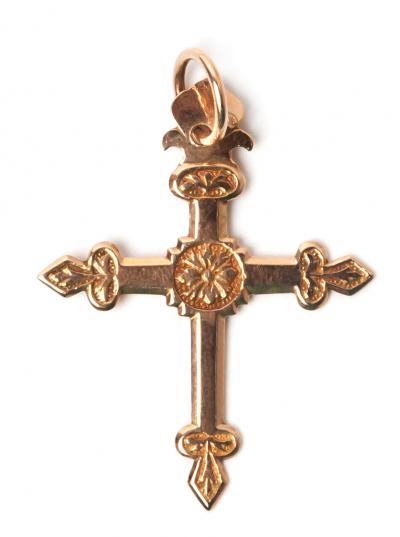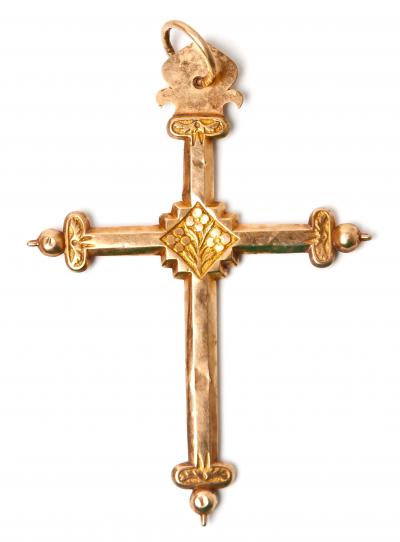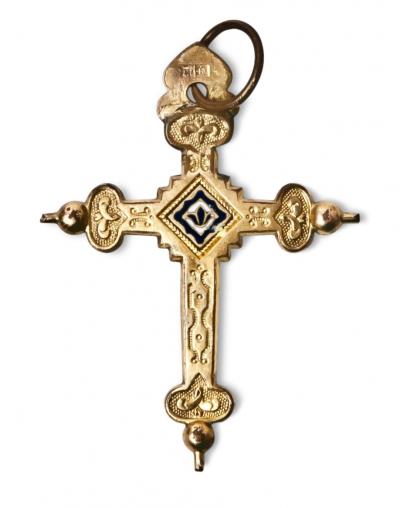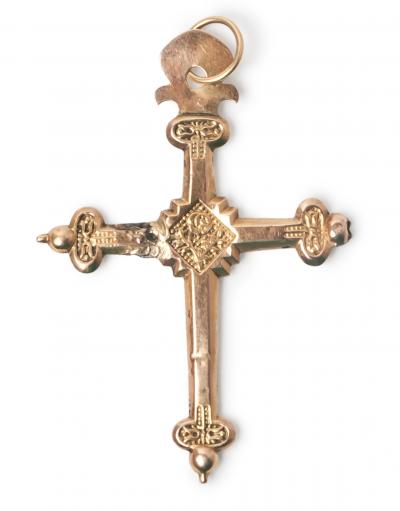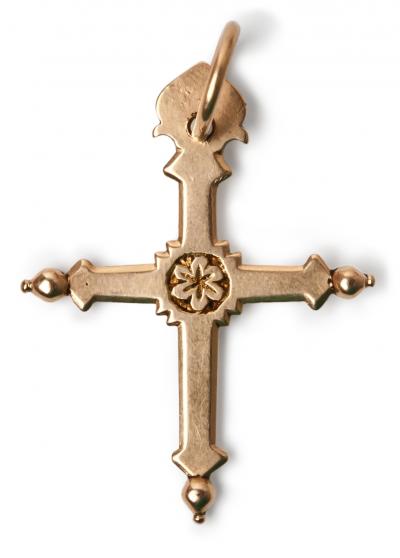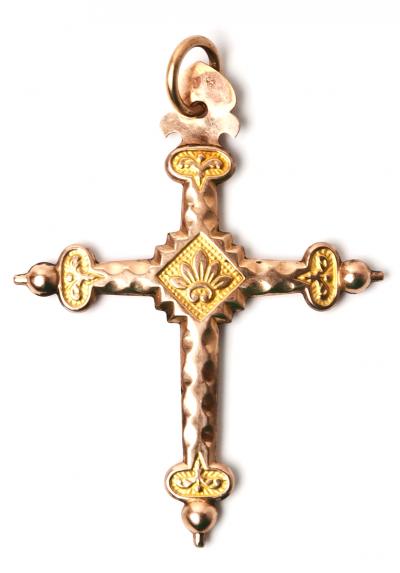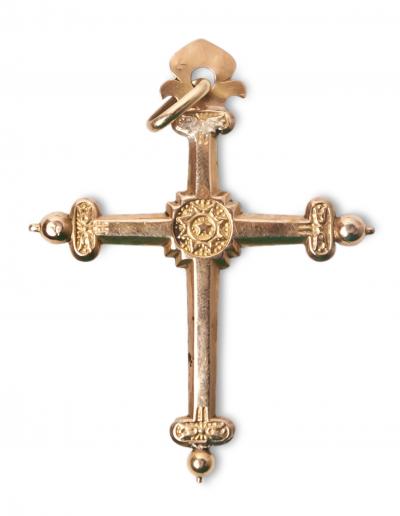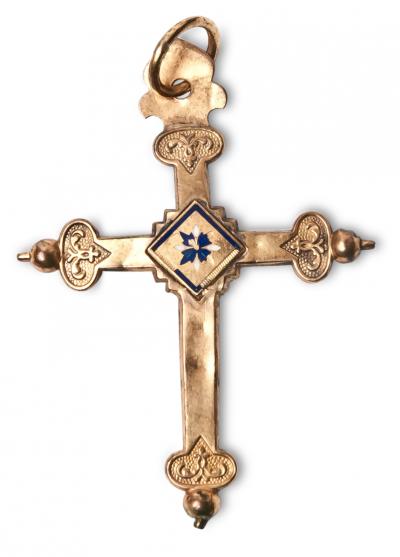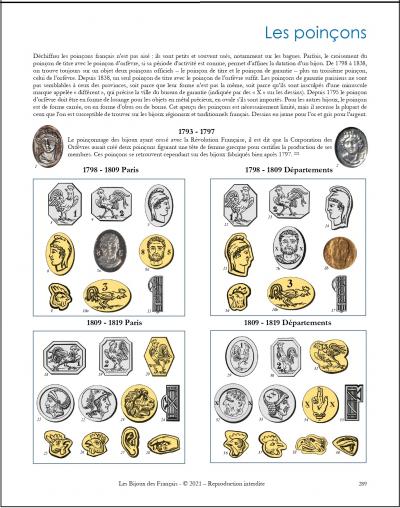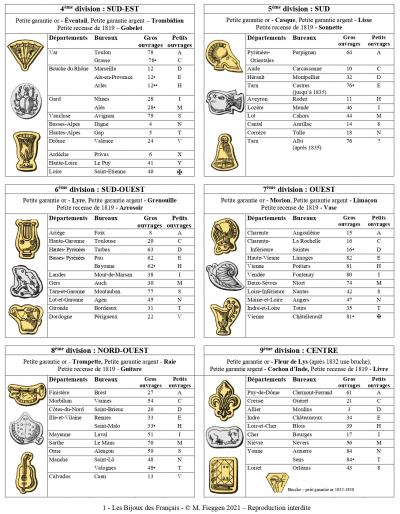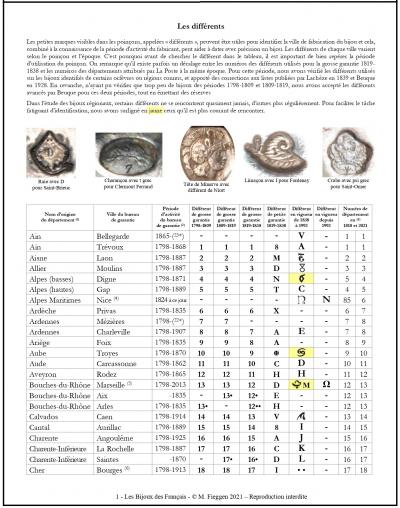Jeannette cross & bibliography

The Jeannette cross and bibliography
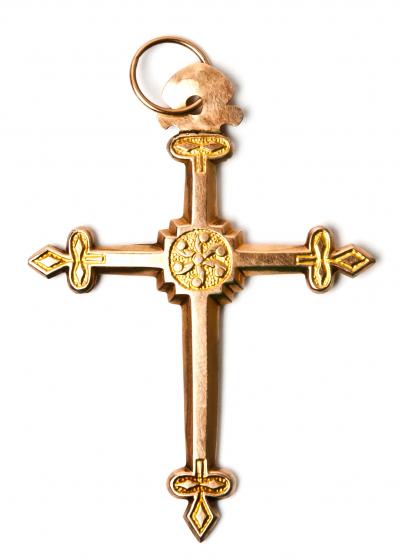
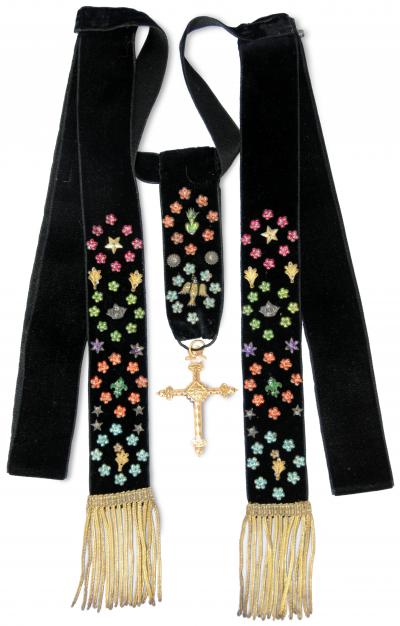
Jeannette cross from Brittany with its orignal velvet ribbon and sequins
The Jeannette crosses were worn throughout France, and particularly in the regions that had not adopted a unique cross of their own. They were inexpensive, being generally of silver or of hollow, stamped gold, even gold-plated. Often produced in Paris, they were resold by local jewellers or by traveling salesmen who set up stands at the local fairs and religious gatherings. In Savoy, however, they were generally locally made of solid not hollow gold or silver and the arms of the Savoy crosses get narrower as you approach the ends.
There are two types of cross Jeannette, differentiated by the shape of the ends of the arms. Some have oval-shaped endings while others have diamond-shaped ends, these are generally from Savoy and often have Sardinian hallmarks. Both types almost always have pointed spheres or egg-shaped tips, although lozenge shaped tips do exist
Some of the Jeannette crosses are plain on both sides while others have a facetted finish on one side, made to resemble a cross that has been roughly hewn with an adze. It's possible that this more sparkling side was worn outwards on Sundays and for special occasions, or perhaps the less sparkling side was worn to church. There are dozens of different designs for the central square or circle; that of a flower is the most popular and the design is often different on the other side. It seems that Jeannette crosses were worn from 1783 by all classes, then only by women in the countryside. After 1872 for a few years there was a renewed fashion for city women to wear them too, then this fashion was over and again the country women were the only ones to wear them.
There are several explanations of the origin of the name of the Jeannette cross.
The play Jerome Pointu was played in 1781 by the actor Volanges with Miss Bisson in the role of Jeannette, the servant of the old prosecutor Jerome, and she appeared on the stage with a small gold cross worn on her neck tied with a black velvet ribbon. The Jeannette cross soon became the rage in all classes of society.
According to the Dictionnaire de l'Industrie et des arts industriels of 1881, "It was then that, around 1781, the jewelers obtained one of their greatest successes, when women, eager for novelties, hung small dolphins on their necks, a transparent allusion to the birth of the son of Louis XVI (known as the dauphin). In 1783 the dolphins were replaced by the Jeannette crosses. (3)
L'Observateur des Modes of 1826 gives another explanation of the origin of the name Jeannette cross. "These crosses were in vogue forty years ago, because of an actress who, under the name of Jeannette, shared with Jerome Pointu, (the actor Volanges), the favor of the public in Jerome Pointu, but this is not their origin: from time immemorial, the servants in our countryside wear gold crosses hanging from a black ribbon, and we call these crosses Jeannettes, because these crosses are what they give themselves or buy themselves on the fête of Saint-Jean, the date when their contracts are initiated or renewed." (1)
Jeannette crosses were often worn with a heart-shaped slide through which the ribbon was run and which allowed the height of the cross to be adjusted. After the crushing naval defeat by the English of the commander François Joseph Paul de Grasse in 1782, it was cynically said that the crosses certain women wore without slides were à de la Grasse, that is to say they were heartless.(2)
According to the magazine Le Corsaire of 1826, this year's fashion is for Jeannette crosses, "but very large."
The Dictionnaire de l’Académie Française of 1881 defines "Jeannette" as "a very young maid".
The Dictionnaire français illustré des mots et des choses from 1889 defines "Jeannette" as "a gold cross that ladies wore hanging on the neck by a velvet ribbon: The Norman peasants still wear Jeannettes tied by a very short ribbon."
And the Dictionnaire Universel des Sciences, des Lettres et des Arts of 1896 called the Jeannette a "gold cross sometimes surmounted by a heart, which peasant women wear suspended with a velvet ribbon, and which the ladies some time ago wore in their imitation". (Note the distinction between city "ladies" and women in the countryside).
It therefore seems that the fashion for the ladies in the cities to wear regional jewels, which restarted around 1872 with the International Exhibition of London, was more or less finished before 1889. A number of so-called regional jewels were in fact produced purely to satisfy this fashion and to be sold to tourists and were not destined for a local clientele. Today it's almost impossible to distinguish these later jewels from the more authentic regional jewels.
Jeannette crosses, gold
|
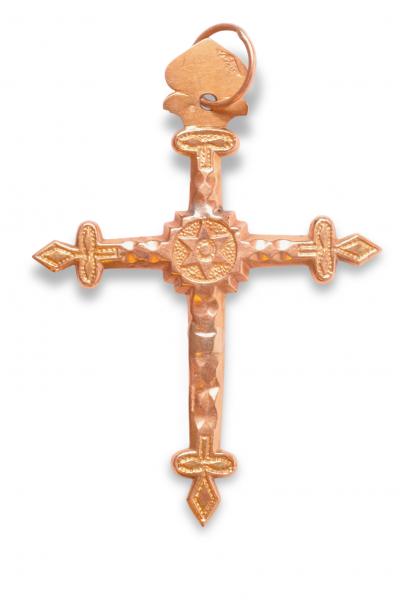
Jeannette cross, gold
|
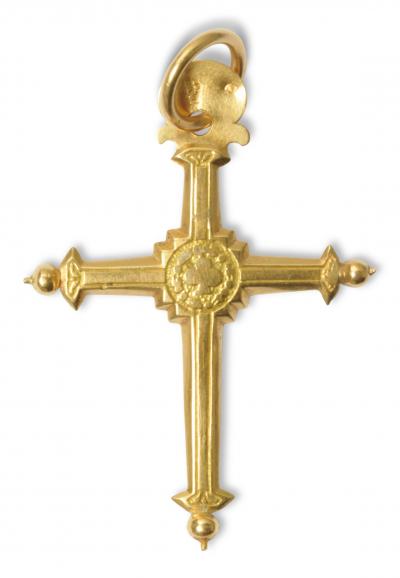
Jeannette cross, gold
|
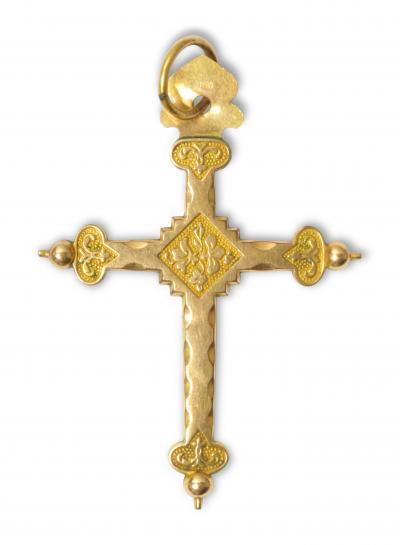
Jeannette cross, gold
|
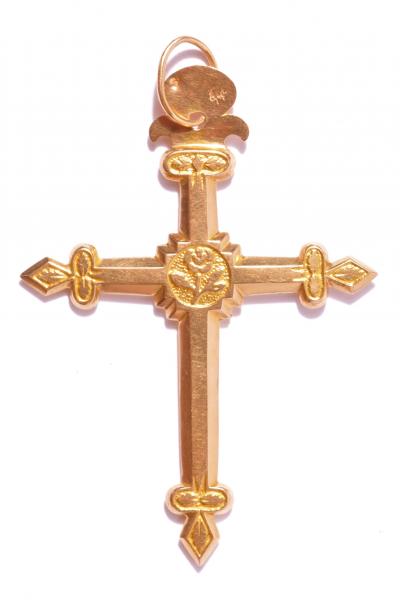
Jeannette cross, gold
|
Jeannette crosses, gold
Jeannette crosses, gold
Savoy Jeannette crosses, gold
Jeannette crosses, gold and silver
Jeannette crosses
Jeannette crosses, gold
|
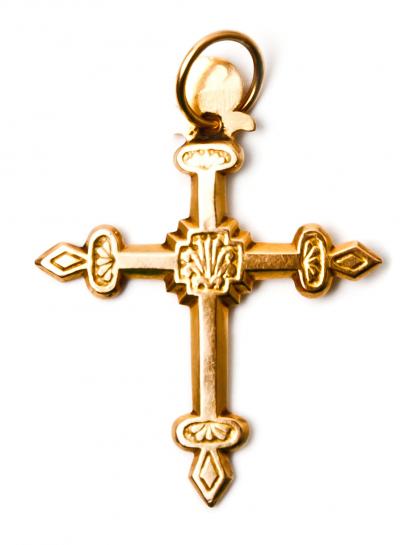
Jeannette cross, gold
|
|
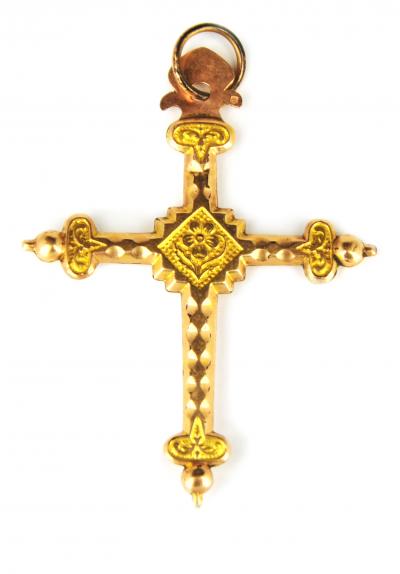
Jeannette cross, gold
|
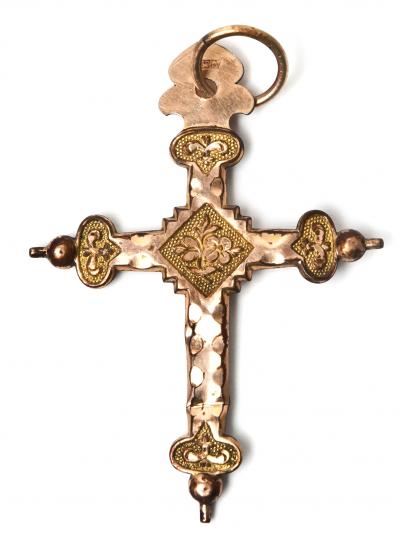
Jeannette cross, gold
|
Jeannette crosses, gold
|
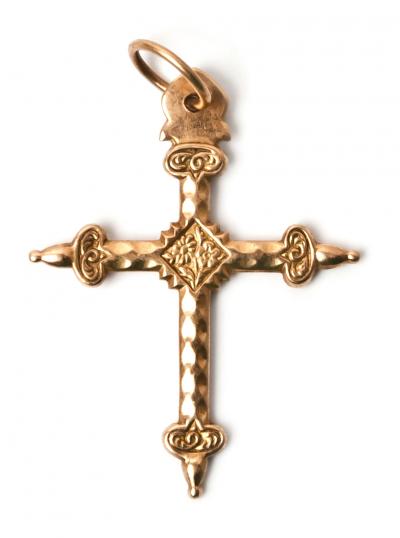
Jeannette cross, gold
|
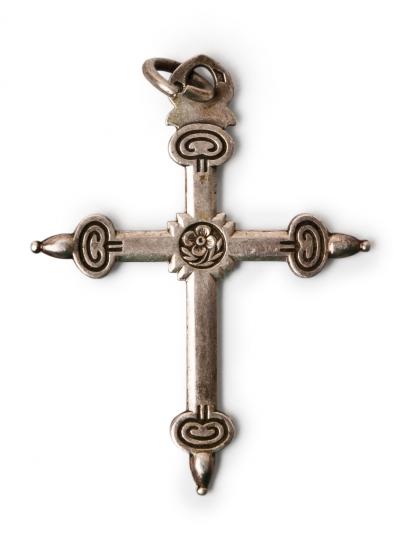
Jeannette cross, silver |
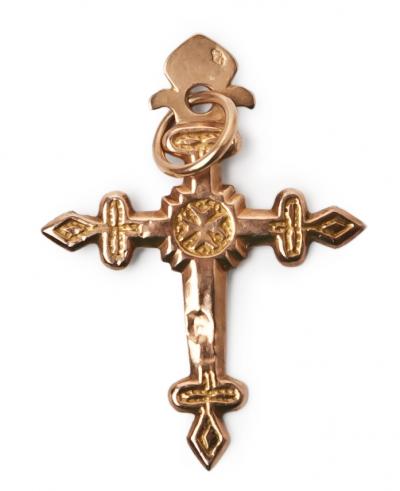
Jeannette cross, gold
|
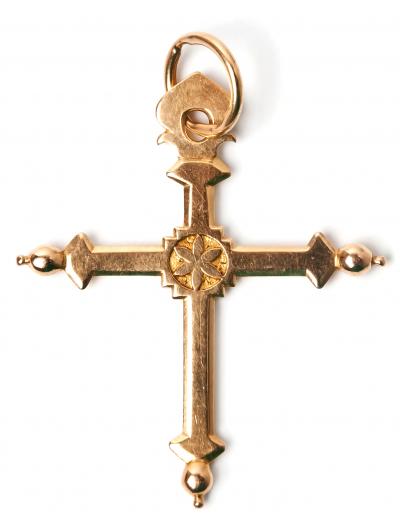
Jeannette cross, gold
|
Jeannette crosses
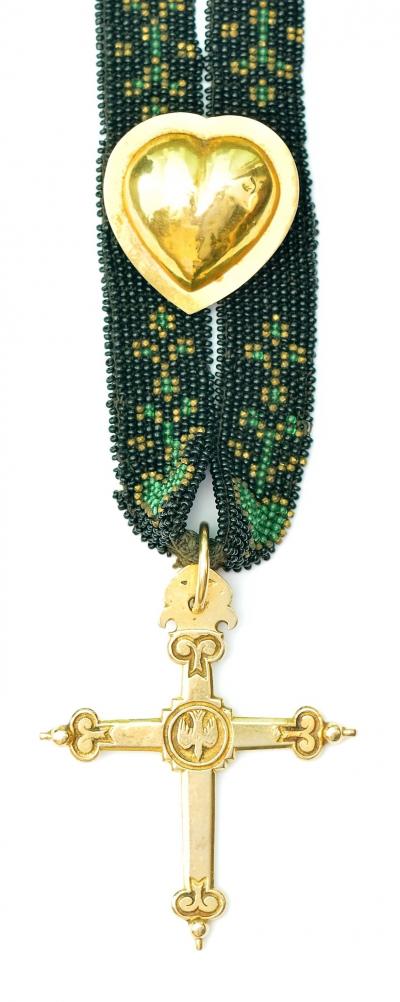
Jeannette cross from Savoy with its slide on a pearled ribbon from Bourg Saint Maurice, gold
|
Rapid identification guide for French regional crosses
Cross without Christ
articulated – North, Normandy, Languedoc Roussillon, Provence, Savoy
with arms of equal length - Savoy
with pendants – Béarn & Pyrénées, Brittany, Centre, North, Savoy
with diamonds – North, Picardy, Provence
with garnets or citrines – Auvergne, Languedoc Roussillon
with Rhinestones – Auvergne, Béarn & Pyrénées, Normandy, Provence
rod cross - Burgundy, Savoy
enamelled – Alsace, Languedoc Roussillon, Provence, Savoy
with filigree – Béarn & Pyrénées, North
with rays - Savoy (the flowered cross)
flat – Brittany, Centre, Dauphiné, Poitou, Provence, Savoy
reliquary - Brittany
tubular – Brittany, Savoy
_________
Cross with Christ only
simple or openworked - Dauphiné, Savoy
with grains - Champagne, Ile-de-France
with pendants – Auvergne, Centre, Limousine, North
hollow with lens decor - Ile-de-France
hollow and flat - Provence
solid – Alsace, Champagne, Lorraine
tubular - Languedoc Roussillon, Savoy
_________
Cross with Christ and Mary
simple or openworked - Alsace, Brittany, Centre, Savoy
enamelled – Auvergne
with pendants – Auvergne, Brittany, Centre, Limousine,
with rays – Brittany, Centre, Champagne, Savoy
reliquary- Brittany, Centre
|
(1): L'Observateur des Modes, Paris, 1826
(2): La France martimes.; Gréhan, Amédée, Chez Piliot & Cie, 1841
Bibliography
note : ***** = must have! **** = very useful and instructive *** = very interesting ** = interesting
ACQUARO, Enrico., Gli ornamenti preziosa dei Sardi, Carlo Delfino, 2000 **
AGNES, Bruno., Emaux bressans parures charmantes, Taillanderie, 1992 **
ASTRUC, Marcel., Bijoux d'Auvergne et du Velay : Orfèvrerie profane et sacrée, ASPPMC, 1999 ***
AUBERT, Edouard., Trésor de l'Abbaye de Saint-Maurice d'Agaune, Memoires de la société nationale des antiquaires de France, Tome trente-deuxième, Nogent-le-Rotrou, 1871
BARBE, Christophe., Les bijoux à connotation religieuse en Normandie au XVIIIème et XIXème siècles, CNES 1997 *
BAROIN, Olivier., Suzanne Belperron, La Bibliothèque des Arts, 2011
BAUDOUIN, Marcel & LACOULOUMERE, Georges., Le Cœur Vendéen, Société d'Anthropologie de Paris, 1903 **
BAYARD, Emile., Le style moderne, Garnier Frères, 1922
BAYARD, Emile., L'art de reconnaître les bijoux anciens, Ernest Grund, Paris, 1924, lien vers BNF
BAYERISCHEN NATIONALMUSEUM., Pariser Schmuck, Hirmer Verlag Munchen, 1989 **
BEHRMANN, Inge., Volkstumlicher schmuck, Museum fur kunst und gewerbe Hamburg, 1985 ***** LE référence indispensable pour l'étude des bijoux régionaux allemands
BESSON, Madeleine et Françoise., Au fil des coiffes, Pyrégraphe, 2003
BEUZE, Lyne-Rose., Costumes Créoles, Editions Fabre Domergue, 1999
BISCH, Paul., Quelques notes sur les bijoux Dauphinois, Procès-verbaux de la Société Dauphinoise d'Ethnologie et d'Archéologie, N° 215-216-217, janvier-février-mars 1952 **
BISCH, Paul., Notes sur les bijoux de Savoie, Société Dauphinoise d'Ethnologie et d'Archéologie, 1954 **
BISSON, Geneviève., Costumes de Bessans à travers les siècles, Editions Derrier, 2012
BJELADINOVIC, Jasna., Costumes ethniques Serbes au XIX et XXème siècles, Musée Ethnographique de Belgrade, 2011 **
BLANCHOT, I, L., Les bijoux anciens, Les éditions pittoresques, 1929
BLONDEL, Madeleine., Pense à moi, Musée de la vie bourguignon Perrin de Puycousin, 1992 ****
BOELL, Denis-Michel., Trésors du quotidien du musée des arts et traditions populaires, Réunion des Musées Nationaux, 2005
BONNEMERE, Lionel., avec Bernadette Guichard, Amulettes et talismans - La collection Lionel Bonnemère, Réunion des musées nationaux, 1991 **
BOULLIET, Jean-Baptiste, Description historique et scientifique de la Haute Auvergne, Paris, 1834
BOURGUET, Pierre., La croix Huguenote, Musée du désert, 1991 **
BREE, Jean de., Kostuum en sieraad in Zeeland, N. V. Uitgeversmaatschappij de Tijdstroom, Lochen 1967 **
BRUNA, Denis., Enseignes de plomb et autres menues chosettes du Moyen Âge, Editions du Léopard d'Or, 2006
BRUNA, Denis., Saints et diables au chapeau - bijoux oubliés du Moyen Äge, Editions du Seuil, 2007
BRUNEAU, Marguerite., Histoire du costume populaire en Normandie, Cercle d'action et d'études normandes, 1983 *****
BRUNEAU, Marguerite., Les bijoux normands, Cercle d'action et d'études normandes, 1976 *****
BRUNEAU, Marguerite., Les bonnets cauchois, Cercle d'action et d'études Normandes, 2004 ****
BOURET, Brigitte., Bijoux et orfèvres en Haute-Normandie, Musées et monuments départementaux de la Seine-Maritime, 1993 *****
CAMPBELL, Marian., Medieval Jewellery in Europe 1100-1500, V&A Publishing, 2009
CARO, Delphine, BENON Laurent & FAIVRE, Aurélie., Emaux de Bresse - Joyaux du quotidien, Editions Snoek, 2014 *****
CANZIANI, Estella., Costumes, traditions and songs of Savoy, Chatto and Windus 1911 **** A noter que l'édition français de ce livre est moins complète que l'édition anglaise et ne contient pas les chansons.
CANZIANI, Estella., Costumes, mœurs et légendes de Savoie, Editions Equinoxe, 2003 *****
CANZIANI, Estella., Il mondo alpino di Estella Canziani, avec Paul Guichonnet et François Forray, Priuli & Verlucca, 2003
CARDUNER, Michel., Arts populaires de Normandie, Editions Ouest-France, 2003
CATOIRE, Christine., Treasures of the Black Death, The Wallace Collection, 2009
CAUHAPE, Maïté., Bijoux pyrénéens de la vallée d'Ossau, Editions Marrimpouey, 2011 ****
CERA, Deanna., L'art du bijou, Flammarion, 1991
CHADOUR, Anna Béatrice., Ringe, die Alice und Louis Koch sammlung, (Bagues, la collection de Alice and Louis Koch ) Maney Leeds England, 1994 ****
CHANLOT, Andrée., Les ouvrages en cheveux, leurs secrets, Chez l'auteur, 1986 **
CHARTON, Edouard., Le Magasin Pittoresque, 1908. BNF
CLOUSOT, Henri., Les bijoux populaires Français, Revue de l'art ancien et moderne, Paris, 1907
CLOUSOT, Henri., Les bijoux populaires, Le Figaro, jeudi 9 août 1934
COPPIER, André-Charles., De Tarantaise en Maurienne, Librairie Dardel
D'ALLEMAGNE, Henry-René., Les accessoires du costume et du mobilier depuis le treizième jusqu'au milieu du dix-neuvième siècle, Schmidt Librairie, 1928 **
DANIELS, Ger., Volksversieringen uit alle werelddelen, C. de Vries -Brouwers b.v.b.a, Anvers, 1989
DE BEAULIEU, François., Coiffes et costumes de Bretagne, Editions Ouest France, 2007
DELIEB, Eric., Silver boxes, Ferndale Editions, 1979
DELOCHE, Maximin., La bague en France à travers l'histoire, Librairie de Paris, 1929 ***
DE LOS LLANOS, José et GREGOIRE, Christiane., Boîtes en or et objets de vertu, Paris Musées, 2011 *
DENEKE, Bernward., Volkstumlicher schmuck aus Nordwestdeutschland, Verlag Schuster Leer, 1977
DEQUIER, Daniel & ISLER, François., Costumes de fêtes en Savoie, Neva Editions, 2013
DEQUIER, Daniel & ISLER, François., Costumes de Savoie, La Fontaine de Siloé, 1996
DIDEROT et d'ALEMBERT., Encyclopédie, planches sur les orfèvres, émailleurs et fabricants de fausses perles, 1751 à 1772 **
DIVIS, Jean., Poinçons d'argent du monde entier, Les éditions de l'amateur, 1989
DOMPNIER, Pierre., Beguines et Bertins - Costumes de Maurienne, Société d'histoire et d'archéologie de Maurienne - Hors série
DORE, François., Marques et signatures: Poinçons de maîtres, les boucles de costumes en France 1650-1830, Editions Massin, 2007 **
DUBOSC, Georges., Les coiffes normands, Chroniques du Journal de Rouen, 1924
DUFOURNET, Paul., L'art populaire en Savoie, Christine Bonneton Editeur, 1981
DUVAL, Denise et Marie Claire., Coiffes et costumes normands, Editions C. H. Corlet, 2002
ELUERE, Christiane., Les ors préhistoriques, Picard, 1982 ***
ELUERE, Christiane., L'or des Celtes, Bibliothèque de Arts, 1987 ***
EOGAN, George., The accomplished art - Gold and gold working art in Britain and Ireland during the Bronze Age, Oxbow Books, 1994
FERRY, Bruno., L’art patriotique face à l’annexion - Alsace-Lorraine 1871-1918. Editions du quotidien, 2015
FLORANGE, Jules., L'amour et le mariage dans la numismatique, Chez l'auteur, Crépin-Leblond, 1936 **
FONQUERNIE, Laurent., Grenat de Perpignan, Bijou du Roussillon, SASL des Pyrénées-Orientales, 2006 ***
FONQUERNIE, Laurent., Le grenat de Perpignan, APHPO, 2010
FONQUERNIE, Laurent., Grenat de Perpignan - Le bijou sang et or, Editions Trabucaire, 2018
FONTENAY, Eugène., Les bijoux, anciens et modernes, Société d'encouragement pour la propagation des livres d'art, 1887 ****
FOURNIER-CARRIE, Raymond., Notes sur le bijou d'Arles, Société des amis du vieil Arles, 1984 **
GANDIN, Alice., Le costume normand, Orep Editions, 2008
GANDOLFO, Francesca & LENTI, Lia., Gioielli - Collezioni etnografiche subalpine, Città di Rivoli Città di Valenza, 2004
GARAUD, Louis., Trois ans à la Martinique, Alcide, Picard et Kahn, 1891
GARNIER, Edouard., Revue des arts décoratifs, Exposition de bijoux normands à Caen, 1883, Paris, BNF
GATINE et LANTE., Costumes des femmes du pays de Caux et de plusieurs autres parties de l'ancienne province de Normandie, le Goupey, 1827 ***
GELIN, Henri., Les bijoux poitevins, Le Pays Poitevin, 1898 ***
GENDRON, Christian., Les bijoux traditionnels poitevins, Editions Musées Vivants Niort, 1992 *****
GERLACH, Martin., Primitive and folk jewelry, Verlag von Gerlag und Wiedling, 1906
GILLARD, Docteur G., Le bonnet rond, Editions du musée Beauceron, 1938
GREWENIG, Meinrad Maria., The Celts - Druids. Princes. Warriors, Edition Volkinger Hutte, 2010
GUICHARD, Bernadette., Amulettes et talismans - La collection Lionel Bonnemère, Réunion des musées nationaux, 1991
HADJADJ, Reine., Bagues Mérovingiennes, Gaule du nord, Editions les Chevau-légers, 2007
HERSEY, Marcia., Collecting baby rattles and teethers, Krause Publications, 1998
HERVOIS, Viviane., Les bijoutiers d'étoiles de Saint Vincent de Digne, Hervois, 2001
HOUZE, Martine, SERRET, Philippe & PORTIER, Emeric., Bijoux régionaux, catalogue de vente à l'Hôtel Drouot de 700 lots le 17 et 18 novembre 1992, 56 pages
JACQUES, André., Enquete sur les bijoux des paysans de Savoie, Revue de Savoie, 1956
JOANNIS, Claudette., Les bijoux régionaux français, une collection à découvrir dans les musées, La revue du Louvre, 1988
JOANNIS, Claudette., Bijoux des régions de France, Flammarion, 1992 *****
JOANNIS, Claudette & GOETZ, Adrien., Bijoux, Flammarion, 2008
JOANNIS, Claudette., Bijoux d'hommes - Signes et insignes, Musée de la Chemiserie de de l'élégance Masculine, 1999
JOHNS, Catherine., The jewellery of Roman Britain, University of Michigan Press, 1996
KERTENIAN, Rémy., Le bijou provençal : parures du quotidien et bijoux de fête, Aubanel, 2003 **
LACOULOUMERE, Georges & BAUDOUIN, Marcel., Le Cœur Vendéen, Société d'Anthropologie de Paris, 1903 **
LAMBERT, Isabelle et Emmanuel, Des bijoux régionaux en général et de quelques croix en particulier, Paris 2011
LAMIRAY, Henri., Costumes normands, G. Lebigre, 1931
LANTE et GATINE., Costumes des femmes du pays de Caux et de plusieurs autres parties de l'ancienne province de Normandie, le Goupey, 1827 ***
LAS CASES, Philippe., L'Art Rustique en France - Dauphiné et Savoie, Etablissement Busson, 1930
LE BRETON, Gaston., Inventaire des bijoux et de l'orfèvrerie appartenant à Mme. la comtesse de Sault, Imprimerie Nationale, 1882
LE THUILLIER, Jean-Pierre., Les costumes régionaux - entre memoire et histoire, Presses universataires de Rennes, 2009 ***
LIVESTRO-NIEWENHUIS, Fea., Die jakken en rokken dragen, Brabantse klederdrachten en streeksieraden, Noordbrabants museum den bosch, 1986 **
MacIVER, Percival., Chats on old jewellery and trinkets, T. Fisher Unwin, 1912
MALAGUZZI, Silvia.; Bijoux, Pierres et Objets Précieux - représentations et symboles, Editions Hazan Paris, 2008
MARCELLIN, J., Album illustré de dessins en cheveux par J. Marcellin, artiste dessinateur en cheveux, à Creil, 1888. Lien vers BNF
MARCEL-ROBILLARD, Ch. & ALLOUIS-ROBILLARD, Jacqueline., Le folklore de la Beauce, volume 10, Editions G.P. Maisonneuve & Larouse, 1975
MARKEZANA, Yves., Les poinçons français d'or, d'argent, de platine de 1275 à nos jours, Editions Vial, 2005 ***
MASSON de SAINT-AMAND, Armand Claude, Mémoire statistique du département de l'Eure, A Paris, de l'imprimerie impériale, an XIII
MASSON de SAINT-AMAND, Armand-Narcisse., Lettres d'un voyageur à l'embouchure de la Seine, Guibert (Paris), 1828 (Armand-Narcisse est le fils de Armand-Claude Masson de Saint-Amand)
MEDVEDEVA, G., Russian jewellery 16th-20th Centuries, Sovietsky Khodozhnik Publishers, 1987
MINDERHOUD, Piet J., Van de goudsmid, Ipskamp, 2009 ***
MITAN, Léa., Le costume comtadin, Reneissènço vedene Vaucluse, 1980
MOL, Sina & Wim., Streeksieraden in Zeeland - Deel I Schouwen-Duiveland, Tholen en Sint-Philipsland, Noord-Beveland, Walcheren, De Koperen Tuin, 1998 ***
MOL, Sina & Wim., Streeksieraden in Zeeland - Deel II Zuid-Beveland en Zeewse-Vlaanderen: het Land van Cadzand, Axel en Hulst, De Koperen Tuin, 1999 ***
MOUILLEFARINE, Laurence et POSSEME, Evelyne., Bijoux art déco et avant-garde, Les Arts Décoratifs, 2009
OPPELT, Wolfgang., Landlicher schmuck, Germanisches national museum, 1982
PERRY, Jane., A collectors guide to peasant silver buttons, Lulu 2007 ***
PERRY, Jane., Traditional jewellery in nineteenth-century Europe, V&A Publishing, 2013 ****
PIQUEREDDU, Paulo & PAU, Anna., Gioielli: Storia, Linguaggio, religiosità dell'ornamento in Sardegna, Ilisso Edizioni, 2004, un exemple (sur les bijoux de Sardaigne) de ce qu'on peut, et doit faire pour mettre en valeur la richesse des bijoux régionaux français *****
PONROUGH PETIT, Anne-Marie., Folklore, Aude. Quelques notes sur le costume traditionnel féminin au pays Narbonnais, 1938
POREE, Le Chanoine Adolphe-André, L’art normand, Fontemoing et Cie, 1913
POULENC, Monique & MARGERIE, Anne-Michèle., Les bijoux traditionnels français, Musée des arts et traditions populaires, RMN, 2005 ***** Indispensable!
PROKOT, Inge & Joachim., Schmuck aus Zentralasien, Callwey, Verlag Munchen 1981
RACINET, Auguste., La costume historique, Firmin Didot, 1888 **
RIVIERE, Georges Henri., Trésors d'art populaire dans les pays de France, Editions des Musées Nationaux, 1956
ROGER-MILES, Léon Octave Jean., La bijouterie, Bibliothèque des merveilles, 1895
ROTHMULLER., Juwelen, Battenberg Verlag Munchen, 1978
ROUCHON, Ulysse., Les bijoux paysans du Velay, Artisans et Paysans de France, 1946 *
SAINT-AMAND, MASSON., Mémoire statistique du département de l'Eure, adressé au ministre de l'Intérieur d'après ses instructions par M. Masson Saint-Amand, préfet de ce département, publié par ordre du gouvernement. A Paris, de l'imprimerie impériale, an XIII
SCARISBRICK, Diana., Bijoux à portrait, Thames and Hudson, 2011 ***
SCARISBRICK, Diana., Les bagues, symboles de richesse, de pouvoir et d'amour, Thames and Hudson, 1993
SCARISBRICK, Diana, (pour Chaumet)., Le bijou de sentiment, de la Renaissance à nos jours, Chaumet, 2008
SCORDIA, Lydwine., Le goût des bijoux - du Moyen-Age aux années Art Déco, Editions Perrin, 2013
SEGALEN, Martine., Amours et Mariages de l'ancienne France, Bibliothèque Berger-Levrault, 1981 *
SEVEZ, Laurent., Notice sur la bijouterie et l'iconographie religieuse des campagnes de la Savoie, Mémoires et documents publié par la Société savoisienne d'histoire et d'archéologie, 1862. Trois gravures des croix figurent sur les pages 273, 274 & 275. ***
SIJELMASSI, Mohamed., Les arts traditionnels au Maroc, 1974
SZENDREI, Jean., Catalogue de la collection de bagues de Madame Gustave de Tarnoczy, A. Levy, 1889
TALLONNEAU, Paul., Le cœur vendéen - Histoire d'un mythe, Editions Hecat, 1990
TERRISE, Henri., La numismatique du mariage, Argenton-sur-Creuse, 2008 **
TERRISE, Henri., Médailles de mariage, jetons, deniers à épouser, treizains et autres en France et dans le monde, Argenton-sur-Creuse, 2016 ****
THIOLLIER, Noel., Les Orfèvres du Puy-Notre-Dame, au Pigeonnier, 1943 ***
TROSSET, Jean-Pierre., Bijoux et croix des provinces de Savoie, Chez l'auteur, 2003 ****
TROSSET, Jean-Pierre., Les croix de Savoie, Chez l'auteur, 1993 ****
VERNIER, Emile-Séraphin., Bijoux et Orfèvreries, Imprimerie de l'institut Français d'archéologie orientale, 1909
VEVER, Henri., La bijouterie Française au XIX siècle, H. Floury, 1908 ****
VICAIRE, Gabriel., Emaux Bressans, H. Lardanchet - Editeur, 1919
WAHLEN, Auguste., Mœurs, usages et costumes de tous les peoples du monde, A la librairie Historique, 1844
WARD, Anne, CHERRY, John, GERE, Charlotte & CARTLIDGE, Barbara., La bague - d'antiquité à nos jours, Office du livre, 1981
WARO - DESJARDINS, Françoise., Le vie quotidienne dans le Vexin au XVIIIe, Editions de Valhermeil, 1992
YVON, Michel., Collectionneur des bijoux régionaux et art populaire, il a légué sa collection au Musée des Arts et Traditions Populaires de Paris, et il se trouve maintenant dans le MuCEM à Marseille.
ZANELLA, Andrea., Musée des arts et traditions populaires, Fragonard, 2003
Coiffes de Vendée d'hier et d'aujourd'hui, Le Vircouet', Geste Editions, 2009
Coiffes et costumes des pays Normands, Fédération Folklorique Normandie Maine, Editions Ouest France, 2008
Costume - Coutume, catalogue de l'exposition au Grand Palais, Réunion des musées nationaux, 1987 *****
Estudios de artes y costumbres populaires, Museo de Artes y Tradiciones Populares, numéros 101-104, 1993
Het streetdrachten boek, Nederlands Openluchtmuseum, Waanders Uitgevers, Zwolle, 2007 **
La tradition en Poitou et Charentes, Libraire de la tradition nationale, 1897 *
Le costume en Normandie au 19è siècle, collection des musées Eugène Boudin et du Vieux Honfleur, Société des Amis du Musée, 2004
Le costume populaire provençal, Musée des arts et traditions populaires, Edisud, 1990
Le diamant - mythe, magie et réalité, Flammarion, 1979
L'élégance et la nécessité - Costumes de Lorraine, Collectif, 2001
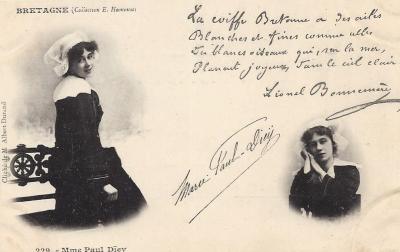
Lionel Bonnemère - avocat, dramaturge et collectionneur de folklore et d'art populaire,
était le fondateur de la collection de bijoux régionaux au Musée National des Arts et Traditions Populaires
The Jeannette cross and bibliography
New book - Traditional French Jewellery
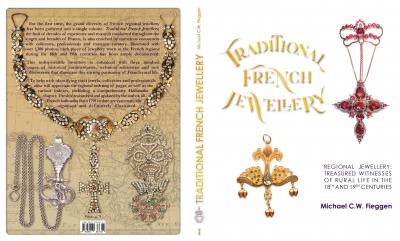
Book - Traditional French Jewellery - order here direct from the author
Dear collectors, auctioneers, dealers and jewellery lovers,
You have visited the site www.bijouxregionaux.com which for twelve years now has listed all regional and traditional French jewellery, without advertising and without sales. By popular demand, this website is now finally available as a book, much more complete and with many new photos and texts that are not on the site. I traveled more than 4,500 km in 2020 to visit the various collectors and museums of France and to photograph, weigh, measure and examine their jewellery.
Large format of 23.5 x 30 cm, 304 pages, hardcover and fully illustrated with over 1300 jewels in color, this book is the first complete book on French regional jewellery and corrects the many errors and gaps observed in the other references and presents other regional jewels hitherto unknown to the public. You will find eight full pages on Breton pins and fibulae and many other jewels in museums and private collections that are not on this website. Over four months of research has gone into making the chapter on hallmarks the most reliable ever seen - clear illustrations of hallmarks have been made especially for this volume. And for the first time, collectors will have access to a complete list of all the assay office symbols, small signs withn the hallmarks that identify in which city the jewellery was hallmarked. The opening and closing dates since 1798 of the hallmark offices are also listed for the first time, allowing, with the office symbol, to better date your jewellery.
The print run of this book is very limited, which is why I recommend you order early. You will love this book I have had nothing but compliments and many clients have ordered more to offer as gifts.
To order, you can send a wire transfer or WISE transfer to Michael Fieggen - FR76 4061 8803 9700 0403 3233 171 – BIC – BOUSFRPPXXX - address Mike Fieggen, 280 rue Saint Honoré, Paris, 75001 France
Bank or wire transfer by www.wise.com in Sterling – Account holder - Michael Fieggen
IBAN - GB68TSBS30916200184462 BIC / SWIFT - TSBSGB2AXXX
Sterling cheques and PayPal welcome to address demosthenesparis@gmail.com.
Any questions ? Contact me at bijouregional@gmail.com or by telephone at + 33 1 4015 9000
One copy in French €75 Postage and packing €9 for France, €8 for Europe and overseas
Two or more copies in French €75 each Postage and packing €9 for the lot in France, overseas postage €8 each
One or more copies in English £75 sterling each Postage and packing £8 sterling each
